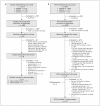Use of acid-suppressive drugs and risk of pneumonia: a systematic review and meta-analysis
- PMID: 21173070
- PMCID: PMC3042441
- DOI: 10.1503/cmaj.092129
Use of acid-suppressive drugs and risk of pneumonia: a systematic review and meta-analysis
Abstract
Background: Observational studies and randomized controlled trials have yielded inconsistent findings about the association between the use of acid-suppressive drugs and the risk of pneumonia. We performed a systematic review and meta-analysis to summarize this association.
Methods: We searched three electronic databases (MEDLINE [PubMed], Embase and the Cochrane Library) from inception to Aug. 28, 2009. Two evaluators independently extracted data. Because of heterogeneity, we used random-effects meta-analysis to obtain pooled estimates of effect.
Results: We identified 31 studies: five case-control studies, three cohort studies and 23 randomized controlled trials. A meta-analysis of the eight observational studies showed that the overall risk of pneumonia was higher among people using proton pump inhibitors (adjusted odds ratio [OR] 1.27, 95% confidence interval [CI] 1.11-1.46, I(2) 90.5%) and histamine(2) receptor antagonists (adjusted OR 1.22, 95% CI 1.09-1.36, I(2) 0.0%). In the randomized controlled trials, use of histamine(2) receptor antagonists was associated with an elevated risk of hospital-acquired pneumonia (relative risk 1.22, 95% CI 1.01-1.48, I(2) 30.6%).
Interpretation: Use of a proton pump inhibitor or histamine(2) receptor antagonist may be associated with an increased risk of both community- and hospital-acquired pneumonia. Given these potential adverse effects, clinicians should use caution in prescribing acid-suppressive drugs for patients at risk.
Figures



Similar articles
-
Acid-suppressive medications and risk of pneumonia in acute stroke patients: A systematic review and meta-analysis.J Neurol Sci. 2019 May 15;400:122-128. doi: 10.1016/j.jns.2019.02.041. Epub 2019 Mar 13. J Neurol Sci. 2019. PMID: 30927619
-
Proton pump inhibitors: bacterial pneumonia.Prescrire Int. 2012 Sep;21(130):210-2. Prescrire Int. 2012. PMID: 23016253 Review.
-
Association between gastric acid suppressants and Clostridium difficile colitis and community-acquired pneumonia: analysis using pharmacovigilance tools.Int J Infect Dis. 2007 Sep;11(5):417-22. doi: 10.1016/j.ijid.2006.11.004. Epub 2007 Mar 2. Int J Infect Dis. 2007. PMID: 17336566
-
Use of acid-suppressive drugs and risk of fracture: a meta-analysis of observational studies.Ann Fam Med. 2011 May-Jun;9(3):257-67. doi: 10.1370/afm.1243. Ann Fam Med. 2011. PMID: 21555754 Free PMC article.
-
Common medications that increase the risk for developing community-acquired pneumonia.Curr Opin Infect Dis. 2010 Apr;23(2):145-51. doi: 10.1097/QCO.0b013e328336eac1. Curr Opin Infect Dis. 2010. PMID: 20075727 Review.
Cited by
-
Deprescribing of proton pump inhibitors in older patients: A cost-effectiveness analysis.PLoS One. 2024 Oct 7;19(10):e0311658. doi: 10.1371/journal.pone.0311658. eCollection 2024. PLoS One. 2024. PMID: 39374218 Free PMC article.
-
GERD: Latest update on acid-suppressant drugs.Curr Res Pharmacol Drug Discov. 2024 Aug 23;7:100198. doi: 10.1016/j.crphar.2024.100198. eCollection 2024. Curr Res Pharmacol Drug Discov. 2024. PMID: 39282236 Free PMC article.
-
Potentially inappropriate medication as a predictor of poor prognosis of COVID-19 in older adults: a South Korean nationwide cohort study.BMJ Open. 2024 Jul 17;14(7):e073367. doi: 10.1136/bmjopen-2023-073367. BMJ Open. 2024. PMID: 39019633 Free PMC article.
-
Acute COPD exacerbations and in-hospital treatment-related problems: An observational study.PLoS One. 2024 Jun 6;19(6):e0305011. doi: 10.1371/journal.pone.0305011. eCollection 2024. PLoS One. 2024. PMID: 38843229 Free PMC article.
-
Problematic meta-analyses: Bayesian and frequentist perspectives on combining randomized controlled trials and non-randomized studies.BMC Med Res Methodol. 2024 Apr 27;24(1):99. doi: 10.1186/s12874-024-02215-4. BMC Med Res Methodol. 2024. PMID: 38678213 Free PMC article.
References
-
- Roughead EE, Ramsay EN, Pratt NL, et al. Proton-pump inhibitors and the risk of antibiotic use and hospitalisation for pneumonia. Med J Aust 2009;190:114–6 - PubMed
-
- Gregor JC. Acid suppression and pneumonia: a clinical indication for rational prescribing. JAMA 2004;292:2012–3 - PubMed
-
- Vanderhoff BT, Tahboub RM. Proton pump inhibitors: an update. Am Fam Physician 2002;66:273–80 - PubMed
-
- Laine L, Ahnen D, McClain C, et al. Review article: potential gastrointestinal effects of long-term acid suppression with proton pump inhibitors. Aliment Pharmacol Ther 2000;14:651–68 - PubMed
Publication types
MeSH terms
Substances
LinkOut - more resources
Full Text Sources
Other Literature Sources
Medical

